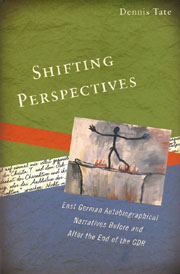Book contents
- Frontmatter
- Contents
- Acknowledgments
- List of Abbreviations
- Introduction: East German Autobiographical Narratives: Challenging Conventional Genre Distinctions
- Part 1 Historical Overview
- Part 2 Case Studies in Autobiographical Writing
- 2 Brigitte Reimann: The Constraints of First-Person Fiction
- 3 Franz Fühmann: The Deconstruction of an “Exemplary” Biography
- 4 Stefan Heym: Strategies of Self-Concealment in Fictional and Autobiographical Mode
- 5 Günter de Bruyn: From the ”Lies” of Fiction to the “Truth” of Autobiography?
- 6 Christa Wolf: “Subjective Authenticity” in Practice: An Evolving Autobiographical Project
- Bibliography
- Index
6 - Christa Wolf: “Subjective Authenticity” in Practice: An Evolving Autobiographical Project
from Part 2 - Case Studies in Autobiographical Writing
Published online by Cambridge University Press: 05 February 2013
- Frontmatter
- Contents
- Acknowledgments
- List of Abbreviations
- Introduction: East German Autobiographical Narratives: Challenging Conventional Genre Distinctions
- Part 1 Historical Overview
- Part 2 Case Studies in Autobiographical Writing
- 2 Brigitte Reimann: The Constraints of First-Person Fiction
- 3 Franz Fühmann: The Deconstruction of an “Exemplary” Biography
- 4 Stefan Heym: Strategies of Self-Concealment in Fictional and Autobiographical Mode
- 5 Günter de Bruyn: From the ”Lies” of Fiction to the “Truth” of Autobiography?
- 6 Christa Wolf: “Subjective Authenticity” in Practice: An Evolving Autobiographical Project
- Bibliography
- Index
Summary
A Reputation Restored? Wolf's Changing Fortunes in the Berlin Republic
CHRISTA WOLF IS OF PARTICULAR IMPORTANCE to this study both as the author who, in her essay “Lesen und Schreiben,” most effectively articulated her generation's aspiration toward “subjective authenticity” and as the most consistent exponent of this aesthetic in the sequence of her first-person prose works that begins with Nachdenken über Christa T. in 1969. More than any other of the five authors examined in detail here, Wolf has also remained in the spotlight of critical analysis since the late 1960s, attracting controversy in the GDR and establishing an international reputation with Christa T. and Kindheitsmuster (1976), working through a crisis of political commitment in her writing of the 1980s, encapsulated in Sommer-stück (1989), and finding herself the focus of an intense East-West conflict through the first decade of unified Germany before successfully returning to her long-term autobiographical project with Leibhaftig (2002).
Henk de Wild's extensive Bibliographie der Sekundärliteratur zu Christa Wolf, published in 1995, could already be expanded into a substantial second volume on the basis of the constantly growing volume of new material that has appeared since then. The postunification opening of the archives relating to Wolf's work of the 1960s and 1970s has added particularly to our understanding of Nachdenken über Christa T.
- Type
- Chapter
- Information
- Shifting PerspectivesEast German Autobiographical Narratives before and after the End of the GDR, pp. 194 - 236Publisher: Boydell & BrewerPrint publication year: 2007



